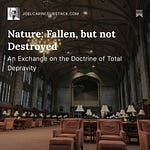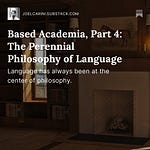I am, or was, a Reformed theology nerd. Aptly described as young, restless, and reformed, my shelves are littered with tomes by Calvin, Edwards, Hodge, Berkouwer, and Bavinck, not to mention Schaeffer, Tripp, Ryken, etc. Once, I visited Bethlehem Baptist Church and waited in line afterward to speak with John Piper. As I shook his hand, I broke into tears and Piper gave me a hug. I’ve done editing for Reformed Forum and attended Orthodox Presbyterian Churches and even a conference with Daryl Hart and John Muether (look them up), all which people and organizations consider themselves so Reformed that the young, restless, and reformed don’t even merit the title. Yet now, fully five years out of seminary, I am mainly happy to have it all behind me. I am glad to have gotten something out of my system; I am not as pleased to have been shaped by the institutions and culture in the ways that I was.
In particular, I have a feeling about Reformed theology much like what Ludwig Wittgenstein said about the natural sciences: “We have a sense that when everything that natural science (Reformed theology) can say has been said, that the main problems of life have been left untouched.” So too, I feel that, while I can throw my weight around in theological debate with the best of them, not to mention simply represent well the consensus position of the Reformed theological tradition, my education left essentially untouched the main problems of life. Many of these problems I was able to studiously avoid during my time in college and seminary or they had not yet become pressing for me. I inhabited the ivory tower, even as a lowly undergrad and graduate student. Life post-seminary began to force upon me the real problems of the Christian life, which are not theoretical, in the technical sense - concerned with what the nature of things is - but are practical, concerned with what to do, how to live.
Even during seminary, I found myself having to seek outside of the Reformed, and even Protestant tradition for wisdom on practical, political matters. Obergefell came down after my first year of seminary, and the purportedly Reformed approach to ethics on offer concurred with the secular culture that only one who had surrendered his mental faculties to a supernatural agent could believe that marriage was between a man and a woman. I turned to the Catholics for help, attending several seminars of the Witherspoon Institute, a politically conservative institution on the border of the Princeton University campus. While I knew that natural law was not an exclusively Catholic doctrine, the main Protestant academic writing on the subject treated the doctrine of natural law as a reason to surrender the public square and privatize religious perspectives. (The Westminster East and Westminster West perspectives turned out to be simply two versions of the same Anabaptist political theology, disguised as Reformed.)
But by “practical,” I do not mean primarily “political.” It is true that Reformed teaching had not given me too much material with which to form a political outlook, but I think of a willingness to give political guidance as only a very rough proxy for actual practical teaching.
My seminary and the churches I attended did indeed attempt to remain studiously apolitical, this in spite of the quite conservative ranks of their congregants. This left them adrift in the midst of 2020’s barrage of epidemiological and political upheaval. But again, this was merely a symptom of the lack of practical teaching within the church. After all, the political questions of how to deal with an epidemic or address ethnic conflict arise from much more immediate and practical questions of how to prioritize health and approach disease and interact with people of different ethnicities in one’s own life. I do not primarily urge churches to address the political matters but the moral matters of life.
The lack of practical teaching in Reformed circles has the following structure. In reaction to a sort of American fundamentalism, Reformed teaching is supposed to avoid moralism and pet theological or moral topics. Instead, the pastor is to preach expositorily through the Bible. This preaching through the Bible, however, is always to be “gospel-” or “Christ-centered,” that is to have a focus on redemption accomplished. This is especially true in the Old Testament, that is not to be used “moralistically” to inculcate moral teaching but Christologically, to indicate the typological foretelling of Christ’s accomplishment of redemption. So far, this all sounds good and familiar.
However, this summary of the task of Christian teaching and preaching is straightforwardly antinomian. One sees this most clearly in its treatment of the law. The Calvinist Reformation, distinguishing itself from the other branches of Protestantism, Lutheranism and Anabaptism, taught three uses of the law. (Read it - three!) The 20th-21st century “gospel-centered” Reformed movement teaches as central to its movement only one, the first use of the law, “to drive us to Christ.” It is in the nature of such a critique as I am making that there are plenty of examples in which the other uses would be mentioned. But these were not central to the message of the movement and have no constitutive place in its ideology.
Notably, the second use of the law is a civil or political one, and that is something from which the gospel-centered have shied away, not always in the name of “winsomeness,” mind you. Among my fellow first-year seminarians, there was a common perspective that change to society would not come through politics but through the preaching of the gospel. In short, we had a preference for the first over the second use of the law as more relevant and preparatory to our presentation of the gospel.
The third use of the law is the one I am arguing was notably missing. Again, this is not to say that it was absent. Instead, remember back to the Gospel Coalition blog debate between Tullian Tchividjian and Kevin DeYoung on exactly this matter. The fact that Kevin DeYoung had to argue for the third use of the law against an avowed antinomian, whose life later undermined his argument, revealed that acceptance of the third use of the law was not essential to the coalition named “Gospel.” It was after all a “gospel” coalition, not a “law” coalition.
As I lacked teaching about the second and third uses of the law, I sought them elsewhere, trying to make up for the deficiencies of “gospel-centered” ideology. I have already mentioned my seeking for teaching on the natural law from Catholic and politically conservative sources. (This was later matched by my discovery of like-minded Protestants through the “Davenant Trust,” now Davenant Institute.) I also pursued the study of philosophy as an attempt to form a perspective on the many areas of life that Reformed theology (as currently practiced) had left unaddressed. Here, I found the philosopher Roger Scruton formative, especially as he was not himself an orthodox Christian. Finding wisdom and truth in such a source confirmed in my mind that practical wisdom was to be discovered in large part from the natural law, not from exclusively Christian sources, and not exclusively from the gospel itself. The rise of Jordan Peterson only added to my confidence that nature and grace were so related.
My embrace of these various philosophers was not without theological foundation. A lack of belief in natural law is a major theological error. Chiefly, I have come to see that the attempt to present the gospel without acquainting the lost with the law of God is deeply foolish. The gospel offers us salvation from the wrath of God, due to us for our sin. But unbelievers in our secular culture do not believe that God is wrathful, nor even that they are sinners. As such, if we present the gospel without the law, we end up tailoring the gospel we offer to the problems unbelieving secularists already have, which are primarily psychological ones, a feeling of anxiety, or shame, or if we are lucky, guilt. But while therapy for these is the fruit of Christian salvation, salvation from anxiety, shame, and the feeling of guilt are not of the essence of the gospel. Secular therapies, both psychotherapeutic and pharmaceutical, reliably deliver unbelievers from these maladies. The Christian gospel is not yet another therapy for what ails us. The gospel offers a solution to a problem we didn't primarily concern ourselves with; it is deliverance from a problem many of us don’t know we have. As such, the law is essential preparation for the gospel. If secular unbelievers are not made to feel bad, then the Christian gospel will not make them feel better in the way it is meant to, namely by delivering them from the consequences of sin and from sin itself. Gospel-only is no gospel at all.
Accordingly, the many sermons I heard in Reformed churches that ended by pointing us to Christ but at no point made us feel guilt before the law of God left me less sensitive to even my own need of the gospel. At the same time, feeling without guidance in my own Christian life, and especially then, as a father of two, now three, young children, sermons ceased - entirely - to speak to my soul. I was and am in over my head; I need guidance; I need an alternative to the stress and anger I can feel.
Notice what has happened here. Not only the second and third uses of the law, but even the first, to drive us to Christ, I discovered to be missing from Reformed preaching and teaching. The goal of preaching was to make sure that I never felt bad, given that I was saved. It was Calvinism as self-esteem, an unholy mash-up of hyper-calvinism and modern therapeutic deism.
In part, I think it can be put down to a culture that prohibits judgment; accordingly, it is actually uncouth to pronounce judgment, to hold up a standard and hold people to it. On the other hand, I think this cultural prohibition is particularly pronounced among the middle and upper classes, among whom the primary problems of life have ceased to be physical and have become psychological. While the prosperity gospel speaks to the poor and the lower-middle class, a therapeutic gospel speaks to middle and upper classes. Of course, Reformed theology, whether old or young, has appealed to a more educated audience. The sociological divide between, for example, fundamentalists or dispensationalists and the Reformed is not often mentioned as perhaps more determinative of the difference than the theology.
I also think back to some of the online preachers I listened to early on, that provided a gateway to Reformed theology. One of the main messages I heard was that megachurches were seeker-sensitive and that the true gospel turned people away. Folks like Francis Chan on the more approachable end, and Paul Washer on the more abrasive, spoke this message, and I found it to lead me toward a more demanding theology, which I connected to Calvinism. However, looking back, the flavor of preaching these men offered was more Anabaptist (Chan) or revivalist-Wesleyan? (Washer) in flavor. The preachers themselves were or were becoming Reformed and hence led me toward other Reformed preachers.
But as I followed this path, the hard-hitting preaching reduced to doctrinaire expository, Christ-centered preaching. The emphasis on the difficulty of Christ’s message, and on the themes of Christ’s own preaching began to fade out. In fact, Reformed teachers often had difficulty accommodating Christ’s message to the “justification is the gospel” that they mistook for the message of the Reformation. Officially, “justification is the gospel” is the mesage of Lutheranism, whereas the Reformed recognized the third use of the law.
The solution to today's Reformed theology is, in large part, a return to yesteryear's Reformed theology, but with, perhaps, a dose of the Anabaptist emphasis on communal life.
If Reformed theology has lost its way, what would follow from a return to the law of God in each of its three uses?
Here are fifteen suggestions, with which I close:
Preaching that convicts and only offers grace to those who feel conviction of sin.
Unabashed support for public morality and civil religion, even though this is relativized in importance.
Preaching that turns people away who don’t want to adopt the demands. Like, actually turns people away. People (Christians!) visit a church, are offended, and don’t come back.
Churches that coalesce along particular views of what that law requires. Each Amish community subscribes to a particular Ordnung, even though these vary from community to community.
Christian communities that actually provide seven-day a week community, much more than once a week.
Smaller Christian communities that are distinctive that are slandered as “cults.”
Frank conversation between Christians, calling out sin, discussing the standards of community life and individual holiness.
Expectations of counseling and achieving psychological and spiritual holiness, not just for grave problems.
Calvinist-cum-Stoic philosophy and therapy for the soul, the emotions, the passions, instead of a hands-off approach, or assuming people can just make it through.
Church discipline.
Community oversight over the forming of marriages and prohibition of modern dating.
Forming such communities across or between institutional churches, coalescing around a classical Christian school, for example.
Function more like religious minorities, the Orthodox Jews, the Mormons.
Escape from the slavery of work and prioritization of home, family, community, and church; abandoning of mammon, the American dream.
Separation from the realm of technological entertainment. Living in real, local communities.















Share this post